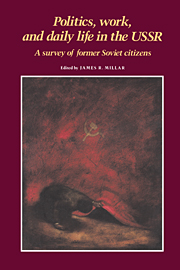Book contents
- Frontmatter
- Contents
- Foreword
- List of contributors
- PART I INTRODUCTION
- PART II POLITICS: SOURCES OF REGIME SUPPORT
- PART III WORK: ECONOMIC/DEMOGRAPHIC TRENDS
- PART IV LIFE: SOCIAL STATUS, ETHNIC RELATIONS, AND MOBILIZED PARTICIPATION
- 9 Perceptions of social status in the USSR
- 10 Nationality policy and ethnic relations in the USSR
- 11 Mobilized participation and the nature of the Soviet dictatorship
- Appendix A The SIP General Survey sample
- Appendix B Response effects in SIP's General Survey of Soviet emigrants
- Glossary
- General bibliography of Soviet Interview Project publications
- Index
10 - Nationality policy and ethnic relations in the USSR
Published online by Cambridge University Press: 21 March 2010
- Frontmatter
- Contents
- Foreword
- List of contributors
- PART I INTRODUCTION
- PART II POLITICS: SOURCES OF REGIME SUPPORT
- PART III WORK: ECONOMIC/DEMOGRAPHIC TRENDS
- PART IV LIFE: SOCIAL STATUS, ETHNIC RELATIONS, AND MOBILIZED PARTICIPATION
- 9 Perceptions of social status in the USSR
- 10 Nationality policy and ethnic relations in the USSR
- 11 Mobilized participation and the nature of the Soviet dictatorship
- Appendix A The SIP General Survey sample
- Appendix B Response effects in SIP's General Survey of Soviet emigrants
- Glossary
- General bibliography of Soviet Interview Project publications
- Index
Summary
Survey research with recent emigrants from the USSR is valuable not only because it provides new data but because it can be even more valuable as a means of determining the salience of one or another social science theory for the Soviet case. In assessing the applicability of comparative theories of ethnic relations and ethnopolitics it is necessary to look beyond statistical indexes and formal arrangements to examine the informal political dynamics of a system and the subjective inputs of various political actors. Analysts of Soviet politics have traditionally had great difficulty in gaining access to evidence about informal politics, and it is here that the knowledge derived from research with former citizens of the USSR fills a crucial gap.
The insights on nationality relations provided by the Soviet Interview Project (SIP) General Survey and by my previous in-depth interviews with Soviet German emigrants in 1979 indicate that one of the most volatile issues in unofficial Soviet politics is how various nationalities are treated in regard to political and socioeconomic advancement, and this points to the relevance of theories about the instrumental value of ethnicity. As pointed out by Crawford Young (1983), there are two basic strands in comparative theories of ethnicity: “primordialist” and “instrumentalist.” Primordialists emphasize the assumed relevance of the givens of a shared culture. In contrast, instrumentalists view ethnicity essentially as a weapon in the pursuit of collective advantage.
- Type
- Chapter
- Information
- Politics, Work, and Daily Life in the USSRA Survey of Former Soviet Citizens, pp. 301 - 331Publisher: Cambridge University PressPrint publication year: 1987
- 3
- Cited by



